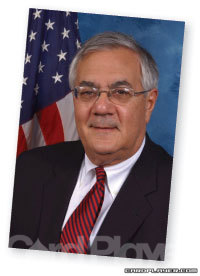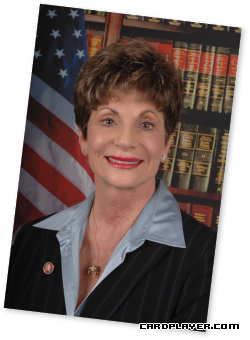






Pappas Discusses the Details of PPA's Fight for Online PokerExecutive Director Talks About Future Congressional Bills |
|
|
 As the executive director of the Poker Players Alliance, John Pappas is the man ultimately responsible for getting everything in place for the poker community’s fight to reverse the finalized regulations of the UIGEA.
As the executive director of the Poker Players Alliance, John Pappas is the man ultimately responsible for getting everything in place for the poker community’s fight to reverse the finalized regulations of the UIGEA.
Pappas became the executive director of the PPA in late 2007 after serving as the vice president of government affairs for the organization since its infancy days in 2005. Under his leadership, the non-profit organization has grown to more than 1 million members and has been especially active in the past few months, both on Capitol Hill and in courtrooms around the country.
While PPA Chairman Alfonse D’Amato discussed the PPA’s role on a broader scale a couple of weeks ago, Pappas took time out of his schedule late last week to share some of the details of what the PPA has specifically been working on. In Part 1 of this interview, Pappas tells Card Player readers about the Congressional bills that the PPA has worked on in the past and what will be different this time around.
Part 2 of the interview will debut tomorrow.
Card Player: The PPA worked to get several bills introduced in the last Congressional session. How many of those bills are still active?
 John Pappas: None of those bills are active, because they were introduced in the previous Congress. What we’re looking at now is a reintroduction of a variety of those bills. For instance, HR 2046, which was Barney Frank’s seminal piece of legislation that would license and regulate Internet gaming, poker, and other games — that will be re-introduced most likely after the Easter recess, so sometime in mid-to-late April.
John Pappas: None of those bills are active, because they were introduced in the previous Congress. What we’re looking at now is a reintroduction of a variety of those bills. For instance, HR 2046, which was Barney Frank’s seminal piece of legislation that would license and regulate Internet gaming, poker, and other games — that will be re-introduced most likely after the Easter recess, so sometime in mid-to-late April.
We are working with Mr. Frank (D-MA) to fine-tune that bill to ensure that it has fewer obstacles than it did in the previous Congress so that it can be voted on. We’re also working with him on some legislative solutions that would address the finalized UIGEA regulations. The status of that legislation is uncertain right now, but the PPA is working with members of the Financial Services Committee to address the current UIGEA regulations.
We’re also working on legislation for the Senate that would focus broadly like Mr. Frank’s bill and/or narrowly focused like Senator Menendez’s bill last year, which was focused only on peer-to-peer.
CP: Who are you working with in the Senate?
JP: Senator Menendez and other members of the Senate have expressed interest in taking the lead on new legislation in this Congress. Quite frankly, we would’ve liked to have some of these bills introduced earlier in the year, but as you can understand, Congress has been preoccupied with other national priorities, and Internet poker legislation certainly is not on the top of many people’s lists, although it is on a lot of people’s radars. It’s the PPA’s job to make sure it’s on people’s radars. We’re going to continue to work quietly behind the scenes to get these bills drafted and finalized, and then we’ll work very publicly to get support for them.
CP: You mentioned Barney Frank’s bill had several obstacles last time around. What’s different now?
JP: Clearly, a big obstacle for us in the previous Congress was the opposition of the sports leagues. We’re trying to work with Mr. Frank to perhaps compromise language that would satisfy the sports leagues, but also allow for licensing and regulation of poker and other games. For a lack of a better term, we want to take the NFL and others off the field. Rather than opposing us, we want them to stay neutral or even better, if there’s something that we could put in there that they like, we’d want them to even advocate for the bill. So that’s what we’re working through right now.
There are no guarantees that the final product will be 100 percent satisfactory to anybody; legislation never is. You have to go back and edit it, re-edit it, and make a final product that everyone can agree on. I’m certain that with all of the bills we introduce, there will be an opportunity for there to be a lot of discourse about the bills and ways that they could be improved. The PPA will be part of those discussions.
CP: Congressman Jim McDermott (D-WA) said he would re-introduce his bill shortly after Congressman Frank re-introduces his bill. Has the PPA been involved with McDermott’s bill, as well?
JP: To a lesser degree. The tax side of things, while it’s important, none of that means anything unless you have a real vehicle in the Barney bill. So, we’ve really focused on making sure the Barney bill is a viable product. The other groups are more equipped to answer the tax questions than the PPA is.
 CP: How involved are you right now with Congresswoman Shelley Berkley (D-NV), who introduced a bill in the last legislative session for a study on the potential effects of Internet gambling?
CP: How involved are you right now with Congresswoman Shelley Berkley (D-NV), who introduced a bill in the last legislative session for a study on the potential effects of Internet gambling?
JP: I don’t believe she’ll be re-introducing her study bill. She’s pretty much stepped off the idea of a study, and I think she’ll be willing to look at a broader license-and-regulation bill.
CP: Why has she dropped that idea?
JP: Because it’s been studied ad naseum already. All a Congressional study would do is slow down the process and provide unneeded delay to an industry that should’ve been regulated years ago. She doesn’t want to bog the process down with a bill like that, and we’re grateful for that, but at the same time, Ms. Berkley is an important member of the tax-writing committee, so she will have a lot of say in what a tax bill will look like at the end of the day — whether it’s a McDermott bill or another bill — and we are as always working closely with her to keep her in the loop with everything that is going on.
Congresswoman Berkley confirmed to Card Player after this interview that she indeed will not re-introduce her study bill, saying that “we’re past that.” She reiterated her support for the poker community and her opposition to the UIGEA.
Pappas will discuss the PPA’s role once these bills are actually introduced, as well as the organization’s active presence in the courtroom in recent months in Part 2 of the interview tomorrow.
